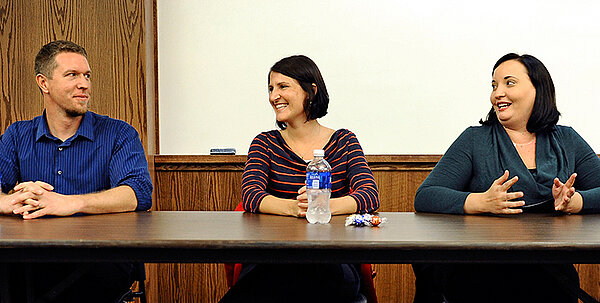
Alumni talk with doctoral students about career options
Published March 15, 2016
It’s hard to break with tradition, but three recent NDSU graduates have and are wildly successful.
Amber Koblitz, Scott Ode and Sara Moeller earned doctorates in psychology and chose careers outside traditional tenure-track faculty positions. They represent a new generation of graduate students who are establishing an array of careers where they use their skills to make a difference.
The NDSU Department of Psychology recently brought Koblitz, Ode and Moeller back to campus. They shared their stories with doctoral students to show the breadth of professional possibilities and opportunities.
Amber Koblitz, social scientist, Food and Drug Administration
Amber Koblitz influences public policy and public health in her position at the Food and Drug Administration. She works for the Center for Tobacco Products, which regulates tobacco and works with both the tobacco industry and anti-tobacco advocates on public health issues.
She first started thinking about a non-academic career during her post-doctorate fellowship at the National Cancer Institute. She worked in cancer prevention and discovered how much she liked applying research to real-world problems. And she saw the jobs available for people who know how to think critically, communicate effectively and use science to solve problems.
“Your education doesn’t give you a job,” she said. “It gives you skills.”
It was a big decision to change career plans after spending so much time preparing for an academic career, but Koblitz has found a career that is a good fit and has a major effect on the country.
“It hasn’t been a straight path, but it has been the perfect path.”

NDSU faculty are focused on helping students succeed. The psychology department invited recent doctoral graduates back to talk with students about how their education can lead to a variety of careers.
Scott Ode, research associate, Medica Research Institute
Scott Ode’s job is similar to a university researcher. He writes grant proposals to secure funding, conducts research and writes papers about the knowledge he creates.
Like many doctoral students, Ode pursued the degree with the goal of becoming a professor. He enjoyed asking questions and finding answers through scientific investigation during his undergraduate research experience. It was exciting to think about making discoveries that would advance the field.
Ode was two years from finishing his program when he started having doubts about becoming a faculty member. He spoke with an alumnus who had a doctorate in psychology and worked in the private sector. The alumnus gave him a job lead that helped him identify the new direction of his career.
At that time, people were just starting to notice and talk about the trend of doctoral students pursuing non-academic careers. The first Ode heard of it was at a conference. That’s why he wanted to tell his story to current students and let them know there are many paths to success.
“There is a lot of opportunity for people with academic degrees,” he said.
Sara Moeller, engineering psychologist, Transportation Security Administration
Sara Moeller’s job is to protect transportation systems from terrorists. The goal of her work is to keep travelers safe and commerce moving.
This is Moeller’s second career. She entered the workforce as an assistant professor at a university in Chicago. This was the job she had doggedly prepared for as a graduate student, and she quickly satisfied the requirements for tenure. Only this significant career milestone didn’t bring her any joy.
That’s when she started looking at government jobs, knowing Koblitz had found an excellent fit at the FDA. Leaving her faculty position was an emotional decision even though she knew it was the right choice. She worried how peers would react. “Would they think I couldn’t hack it?”
Moeller applied for only two jobs before she was hired by TSA. She has found an exciting career where she uses the skills, such as communication and applying scientific research to problems, that she learned at NDSU. One of her projects, for example, was to develop a protocol, using new scientific research, that helps TSA workers assess potential safety threats based on people’s behavior.
Koblitz, Ode and Moeller’s primary message to students was that they have choices. All agree that NDSU prepares its psychology students to be successful whether they choose an academic or non-academic career.